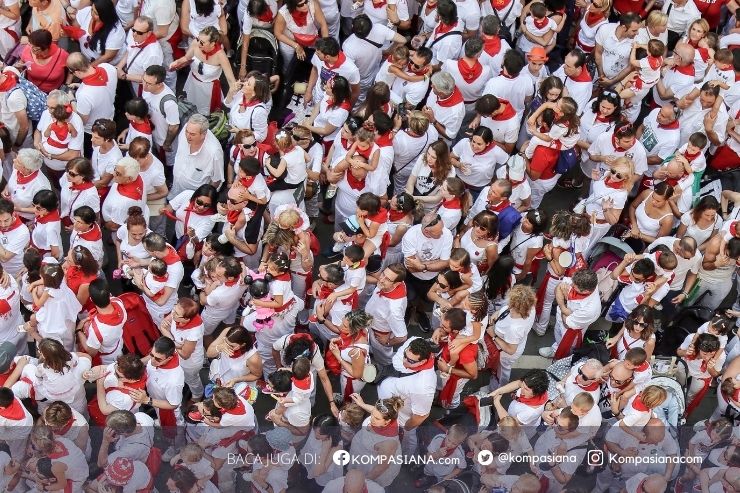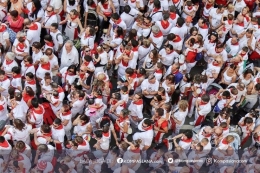Caliph Ali ibn Abi Talib was born to a husband and wife of Abu Talib bin Abdul-Muttalib bin Hashim bin Abdu-Manaf with Fatimah bint Asad bin Hasyim bin Abdu-Manaf. He was born in Mecca, precisely in the Kaaba, Masjid al-Haram, in the hometown of Bani Hashim, Friday 13 Rajab. He was the first person to convert to Islam among children, at that time he was only 10 years old. Chubby body, muscular with broad shoulders, a wide pair of eyes adorns a face that is not too white, with a thick beard and sideburns.
A sharp nose fits well with a pair of sharp eyes under the left and right eyebrows. Solid, sturdy legs and arms are balanced by a moderate figure, not too fat with a fat belly. He was not too tall, not too short, in the midst of the Arab community at that time who was tall. Walking fast and leaning a little forward, something like the way of his cousin Muhammad. He has extraordinary body endurance, he withstands hot and cold air, it is even said that in winter it is so extraordinary that it makes people shiver from the cold he can stand not wearing cold clothes.
Ali ibn Abi Talib received a place in the hearts of the people not only because of his closeness to the Prophet, in the sense of blood relations and family relations but also because of his sympathetic and very distinctive personality traits, which were also inseparable from the Prophet's upbringing. Moral Ali, in addition to being his luggage, is inseparable from the Prophet's upbringing: Generous, graceful, not vindictive, always maintaining the friendship and forgiveness of ties. On the battlefield, in all battles, Ali was always entrusted with the flag of the Prophet, because of his courage, and physical strength that exceeded the normal limits of the men in his circle. Because of that, he was dubbed as "Asadullah". The lion of God.
Political Policy
The first step taken by Amirulmukminin was to conduct a clean-up within his officials. To replace the old governors he appointed his cousin Ubaidillah bin Abbas to Yemen to replace Ya'la bin Umayyah. The two changes above can be carried out easily by Ali, but it is different from the replacement for the candidate for governor of Sham, Sahl bin Hunaif to replace Mu'awiyah bin Abi Sufyan, who is also known as an accomplished statesman and politician.
Arriving at Tabuk, at the Suria border post, he was detained by Mu'awiyah forces and told to return. In order not to cause divisions in the unity of the people, Ali sent people to bring a letter with a request that Mu'awiyah want to pledge allegiance to him and come to Medina with the knowledge of the people of Sham, without further ado or political compromise, for example by appointing him as governor of Sham. In the teachings of Islam, every citizen is obliged to take allegiance to the leader. What is meant by Bai'at is to pledge allegiance to carry out and obey every command of the ruler other than in immoral matters? The confession referred to here is bai'at to legitimate Muslim leaders. In the hadith says:
From Abdullah bin Umar R.A, he said: "In the past, we took allegiance to the Messenger of Allh to hear or take orders and obey the leaders of the Muslims. He said to us, "You must obey as you can." (Narrated by Bukhari and Muslim).
The reason Mua'awiyah did not want to take Ali's allegiance was because: first the charges against the Uthman killers must first be captured and punished; secondly there is no unanimity from prominent Muslim circles. But in reality there were only a few people who did not pledge allegiance, and they were neutral and did not oppose the Caliphate of Ali. This excuse made by Muawiyah aroused suspicion, so that the uprising did not spread, Ali planned to attack Sham first before being attacked. The rejection of Bai'at means an open rebellion against a legitimate government and he must be firm against all forms of rebellion in the country.
Allegations by the rebels that Imam Ali, when he had become caliph, Ali would make everyone enter the world of zuhud, everything they obtained would be taken back, all the wealth they could have been unable to enjoy again. He will defend the poor, all royal splendor and live happily as a rich person will end. Ali will be louder than Umar. Their gold stockpiles, luxury buildings and large tracts of land will be taken back from them and will be handed over to Muslim-owned Baitul Mall. Allegations of those who only draw conclusions from Ali's speech which tends to advocate a simple life, as well as seen from his own life and family that seems very simple. But the question is whether Ali will do such things, while Islam itself recognizes private property. The linkage of the above problems in this modern era is about the rule of legitimacy.
Diplomacy Policy
One tangible example of Ali bin Abi Talib's caliphate diplomacy was when Talha and Zubair asked Ali to appoint him governor of Basrah and Kufa, Ali refused their request in a very subtle way, arguing that he desperately needed senior friends to remain in Madinah, so that he is easy to consult and deliberations on matters of state. Ali's thoughts were only focused on peaceful purposes. When the forces who wanted revenge for Usman's death moved towards Basrah with Aisha as their leader and everyone involved in Uthman's murder was killed, but Ali did not. Ali believes that there is no good reason to finish off a tribe just because, that one of them is committing a crime.
To avoid all the bloodshed that occurred during the Camel War, Ali sent a prominent friend to Aisha. Then the envoy attended a meeting with Talha and Zubair which was attended by Aisha. During the meeting Ali expressed his opinion through the messenger he had sent, that the most effective medicine to end this commotion was with an attitude of peace and solidarity, and that it took time to quell the turbulent emotions, only after everything was peaceful, then the possibility of carrying out investigations against the rebels can be done.
Negotiations carried out by Ali always raise a peace, Ali's actions are in accordance with those carried out by the Messenger of Allah, Ali treats anyone, whatever he is with respect and very polite. Some of the negotiations taken by Ali against Muawiyah were always rewarded with actions that referred to war, but Ali strongly denied this by not arbitrarily taking the wrong decision.







